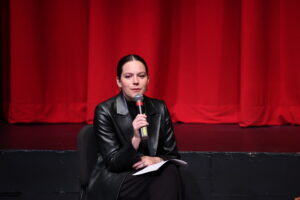September 28, 2023
UConn School of Law Human Rights Student Discusses Asylum Seekers
Over the summer, Form 4 students engaged in an interdisciplinary reading for two classes: The Displaced, a collection of first-hand accounts of refugees for their history class, and the novel Exit West by Mohsin Hamid for their English class. As a culminating experience, they heard from Shae Heitz, a fellow from the UConn School of Law human rights clinic who shared her experiences advocating for Afghan asylum seeker and asylum law practices. Following the discussion, the students moderated a question-and-answer period.

Heitz represented an Afghan woman artist who was active in her community. The woman worked with the USAID, a U.S. agency for international development that helped start her business as an artist. She produced shows at U.S .embassies, met ambassadors, and was very public about her work. When the Taliban took power, they were very aware of her in the community and went to her home, interviewed her family, and questioned them in a detention facility. Fortunately for the woman, she had already fled the country, but her family was traumatized by the experience.

Once the woman was here in the U.S., Heitz explained that she worked with the client through her entire asylum process: filling out the necessary paperwork, writing a “declaration” of her story, and making a legal argument or brief which was submitted to the U.S. government arguing why her client should be able to stay in the country.
Heitz said that the relationship with the displaced person develops quickly because you consult with them often. In the case of the Afghan woman, Heitz met with her client once a week for a semester. “You’re having very difficult conversations,” she said. “And you’re asking them to tell you, a total stranger, the hardest thing they’ve ever gone through.” She said it takes a lot of patience because the client may be scared, nervous, or embarrassed.
“You have to build an environment of trust whenever you are talking to them,” Heitz said.
Heitz’s client entered the U.S. through Operation Allies Welcome, a U.S. government program for Afghans to come to the United States. The government has this program for Ukrainians, but Heitz pointed out that the U.S. government does not do this for all refugees. Despite her client’s challenge in adapting to U.S. life and culture and learning the English language, Heitz’s client’s story ends positively. Her client was granted asylum and will receive a green card in a year and U.S. citizenship in four years. Heitz noted that this timeline was accelerated, as most asylum seekers can wait years due to the backlog of cases.

Heitz explained that theoretically, the Afghans were given a provision that they had to be interviewed within 45 days and receive their decision within a few months. “I know people who have filed for asylum,” she said, “ and they have waited seven years to get an interview.”
One important note that Heitz expressed to the audience was the language used around discussing refugees. Rather than framing the displaced as victims, Heitz noted that many had full and complex lives despite living in difficult conditions in their home country.
“We want to bring language to the conversation that is empowering and provides resilience and doesn’t just frame them as victims,” she said. “They have gone through these challenging situations, but that is not their entire story. They have had incredible lives before they were displaced. I never say, ‘I am working with these vulnerable people.’ I say, ‘I am working with people in vulnerable situations.’ It’s a small difference, but it does make a difference to the people who are listening.”
